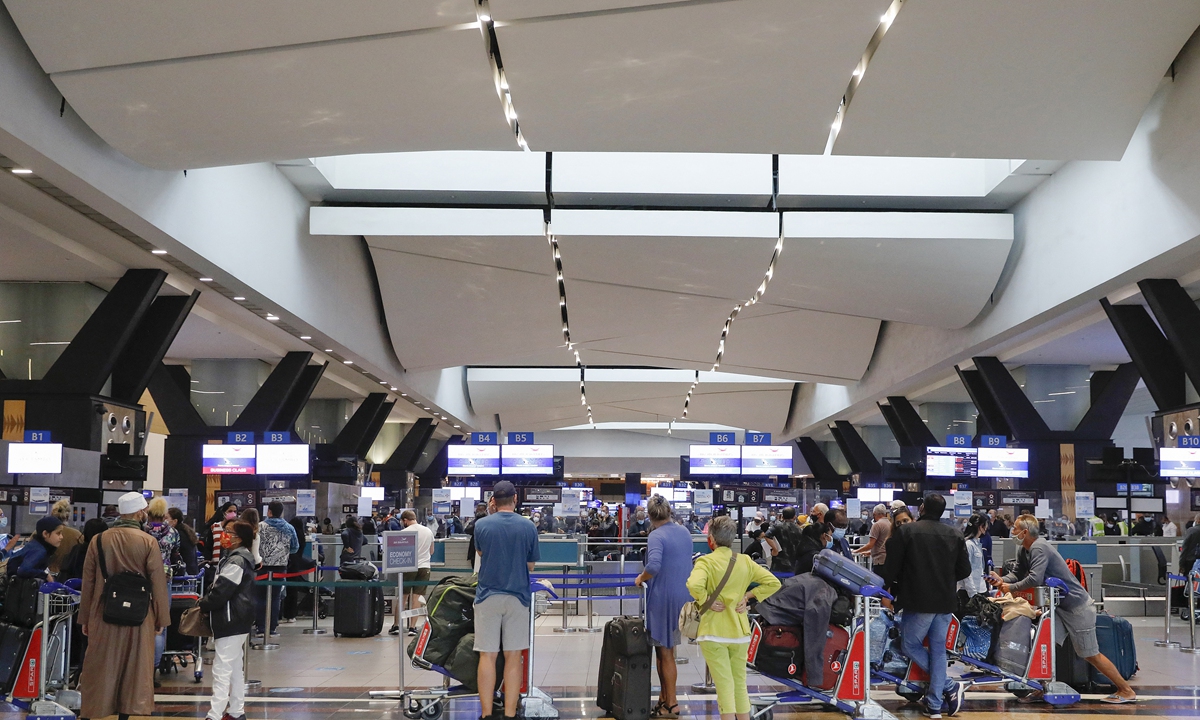Beijing builds testing reserves for Omicron as variant threatens countries without vaccine barrier

Travelers line up at a check-in counter at OR Tambo International Airport in Johannesburg on November 27, 2021, after several countries banned flights from South Africa following the discovery of a new COVID-19 variant Omicron. Photo: VCG
In China's latest effort to battle the new and reportedly more transmissible variant, Beijing has built reserves of testing capacity for Omicron, enabling medical staff to identify the variant immediately.
Beijing has established reserves of testing capacity for the Omicron variant and can identify the variant immediately to prevent and control the virus, Yang Peng, Director of the General Office of the Beijing Center for Global Health under the Beijing Center for Disease Prevention and Control, said during the Beijing-Hong Kong Economic Cooperation Symposium on Monday.
He noted that Beijing is facing the dual risks of imported cases from abroad and domestically transmitted cases.
According to Yang, Beijing has formed reporting and investigation procedures with clear a division of labor and high efficiency. The city's emergency team can reach the location within two hours, finish epidemiological investigations on core information within four hours, and the complete investigations within 24 hours, as epidemiological investigation is the core basis for effective epidemic prevention and control.
"We thought it was time for the world to reopen, but we are more concerned than ever with the emergence of the Omicron variant in countries which have not established a vaccine barrier," Chinaese epidemiologist Zhang Wenhong said at the 2021 Imperial Springs International Forum via video link on Monday.
He said that no more than a quarter of the countries in the world have been fully vaccinated.
The establishment of global immunity barriers had been greatly improved and in countries successfully vaccinated, the epidemic has been controlled and the fatality rate has been reduced drastically, according to Zhang.
However, especially in recent days, the Omicron variant of COVID-19 has caused global alarm and many countries have closed their borders, Zhang said, noting that crucial to containing the pandemic will be how we collaborate globally in the future to improve vaccine barriers globally.
At least 38 countries have reported confirmed cases of the Omicron variant as of December 3.
China has made great efforts in this regard, and I believe that more countries will join hands to fight against the virus in the future, Zhang said. More global efforts are needed to fight against this pandemic based on science and solidarity.

Travelers line up at a check-in counter at OR Tambo International Airport in Johannesburg on November 27, 2021, after several countries banned flights from South Africa following the discovery of a new COVID-19 variant Omicron. Photo: VCG
In China's latest effort to battle the new and reportedly more transmissible variant, Beijing has built reserves of testing capacity for Omicron, enabling medical staff to identify the variant immediately.
Beijing has established reserves of testing capacity for the Omicron variant and can identify the variant immediately to prevent and control the virus, Yang Peng, Director of the General Office of the Beijing Center for Global Health under the Beijing Center for Disease Prevention and Control, said during the Beijing-Hong Kong Economic Cooperation Symposium on Monday.
He noted that Beijing is facing the dual risks of imported cases from abroad and domestically transmitted cases.
According to Yang, Beijing has formed reporting and investigation procedures with clear a division of labor and high efficiency. The city's emergency team can reach the location within two hours, finish epidemiological investigations on core information within four hours, and the complete investigations within 24 hours, as epidemiological investigation is the core basis for effective epidemic prevention and control.
"We thought it was time for the world to reopen, but we are more concerned than ever with the emergence of the Omicron variant in countries which have not established a vaccine barrier," Chinaese epidemiologist Zhang Wenhong said at the 2021 Imperial Springs International Forum via video link on Monday.
He said that no more than a quarter of the countries in the world have been fully vaccinated.
The establishment of global immunity barriers had been greatly improved and in countries successfully vaccinated, the epidemic has been controlled and the fatality rate has been reduced drastically, according to Zhang.
However, especially in recent days, the Omicron variant of COVID-19 has caused global alarm and many countries have closed their borders, Zhang said, noting that crucial to containing the pandemic will be how we collaborate globally in the future to improve vaccine barriers globally.
At least 38 countries have reported confirmed cases of the Omicron variant as of December 3.
China has made great efforts in this regard, and I believe that more countries will join hands to fight against the virus in the future, Zhang said. More global efforts are needed to fight against this pandemic based on science and solidarity.


